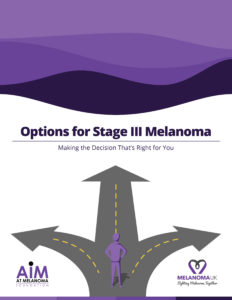New videos from the experts!
Sequencing of Therapies in Stage IV Melanoma
In this video series, Professor James Larkin, Medical Oncologist, The Royal Marsden Hospital, discusses sequencing strategies for Stage IV melanoma. The videos address strategies for neoadjuvant and adjuvant therapy, first-line and subsequent lines of therapy, single-agent and combination immunotherapy, BRAF-targeted therapy, the management of brain metastases, clinical trials, and management of refractory disease. The videos were recorded on August 9, 2023.
James Larkin is a Medical Oncologist specialising in the treatment of cancers of the kidney and skin including melanoma.
Professor Larkin grew up in North Cornwall before taking a first in Natural Sciences from Cambridge University. He undertook clinical training in Oxford, qualifying in 1996. General medical training was undertaken in London and in 2001 he won a Medical Research Council Research Fellowship for a Clinician, carrying out laboratory research leading to a PhD at the Institute of Cancer Research. Specialist training was completed at The Royal Marsden and he was appointed a Consultant in 2008.
His research is focussed on trying to understand cancer and its consequences better, as well as developing improved treatments, particularly with targeted therapies and immunotherapies and globally he is amongst the most highly cited researchers in both melanoma and kidney cancer (James Larkin – Google Scholar).
In 2018 he was elected as a Fellow of the Academy of Medical Sciences and in 2020 as an NIHR Senior Investigator. In 2022 he was appointed to roles as Head of The Royal Marsden Skin Unit, Royal Marsden Joint Training Programme Director for Medical Oncology and Lead of the Cancer Immunotherapy Theme at The Royal Marsden / Institute of Cancer Research NIHR Biomedical Research Centre. Since 2024 he has hosted the educational podcast ‘Melanoma Matters’ with his US colleague Professor Sapna Patel and in 2026 he will be Scientific Co-Chair of the Annual European Society of Medical Oncology meeting in Madrid.
Professor Larkin serves as a medical advisor to the patient advocacy group Melanoma UK, as a trustee of Action Kidney Cancer and sits on the Medical Advisory Board of the International Kidney Cancer Coalition.
When should neoadjuvant or adjuvant therapy be considered in stage IV disease?
Which immunotherapy should be used for front-line BRAF wild-type patients?
Which combination should be used after progression post PD-1 therapy?
What is the role for BRAF-targeted therapy?
How should strategies be personalised for management of brain metastases?
Strategies for refractory disease?
When should a clinical trial be considered?

UPDATE!
The Decision-Support Tool has been updated to reflect changes in therapeutic options, including emerging options and longer-term data on established regimens.
We’d like to thank Diane Cannon from Melanoma UK for her careful review of this content update.
Stage IV Decision-Support Tool
Welcome to this guide, Stage IV Melanoma Treatment Options: Making the Decision That’s Right for You. You can use this guide to discuss therapeutic options for managing Stage IV melanoma with your patients.
The document addresses
- Stage IV melanoma clinical picture, biomarkers and pathology, and disease and patient factors involved in decision making
- Efficacy, safety, administration, and family-planning aspects of targeted therapies, immune checkpoint inhibitors, and other therapies used for stage IV melanoma
- Management of brain metastases, including radiation therapy
- Clinical trials, including an overview of emerging therapies being studied
- Survivorship and advanced care planning
- Diagnosis (including biopsy techniques) as well as an overview of imaging
- Practical patient resources
Developed in collaboration with Melanoma UK.
New videos from oncology experts!
Immunotherapy Combination Therapy: Current and Emerging Approaches
In this video series, Professor James Larkin, Consultant Medical Oncologist, The Royal Marsden Hospital, discusses current and emerging perspectives on the use of combination immunotherapy in oncology. These videos, developed for the UK audience, discuss the rationale for combination therapy, the data supporting the combination approaches, patient selection for combination immunotherapy versus other options, managing the more complex side effects associated with this approach, as well as new strategies of combined immunotherapy. We hope that this content will be useful for you to select and manage the best immunotherapy regimens for your cancer patients.
Rationale for Combined Immunotherapy
What are the data to support the use of combination immunotherapy?
Patient Selection for Combination Immunotherapy
Managing the Complex Adverse Effect Profile of Combination Immunotherapy
Emerging Strategies for Combination Immunotherapy
Updated Stage III Decision Support Tool
The Decision-Support Tool has been updated with information you need to know about outcomes for Stage III melanoma, long-term data for adjuvant therapies, and additional resources, including content specific for caregivers.
Developed in collaboration with the Melanoma UK.

New Stage III Companion Piece
Want to learn how to use the Stage III Decision-Support Tool? Peruse frequently asked questions about Stage III melanoma and learn how to use the support tool to guide your decision making.
Developed in collaboration with the Melanoma UK.

New! BRAF Q&A Compendium
BRAF in Melanoma: Answering Questions, Addressing Misconceptions
In the resources provided below, the AIM at Melanoma Foundation provides answers to questions and addresses misconceptions raised by patients regarding BRAF in melanoma. The patient-directed resources address what BRAF is, the role of BRAF in melanoma, what BRAF mutational status means, testing for BRAF, and the implications of the test results for treatment planning. The answers are provided by Lisa Kottschade, APRN, MSN, CNP, Associate Professor of Oncology at the Mayo Clinic in Rochester, Minnesota, and an expert faculty member of the Melanoma Nursing Initiative.
We thank Novartis Pharmaceuticals for an unrestricted educational grant in support of this important educational initiative. We also thank Gillian Nuttall of Melanoma UK for review and customization of this content for the UK audience.

Print out this pamphlet, which provides Ms. Kottschade’s commentary for specific questions/statements about BRAF.
BRAF Q&A Videos
Click on the videos below to watch Ms. Kottschade’s commentary about BRAF. Below the videos, we have also listed some resources patients might find helpful as they navigate BRAF testing and management of their melanoma.

